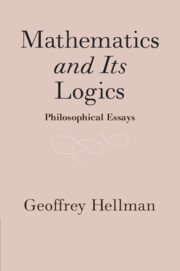Introduction
Published online by Cambridge University Press: 26 January 2021
Summary
Abstract mathematics, from its earliest times in ancient Greece right up to the present, has always presented a major challenge for philosophical understanding. On the one hand, mathematics is widely considered a paradigm of providing genuine knowledge, achieving a degree of certainty and security as great as or greater than knowledge in any other domain. A part of this, no doubt, is that it proceeds by means of deductive proofs, thereby inheriting the security of necessary truth preservation of deductive logical inference. But proofs have to start somewhere: ultimately there need to be axioms, and these are the starting points, not end points, of logical inference. But what then grounds or justifies axioms?
- Type
- Chapter
- Information
- Mathematics and Its LogicsPhilosophical Essays, pp. 1 - 16Publisher: Cambridge University PressPrint publication year: 2021



